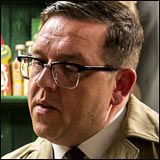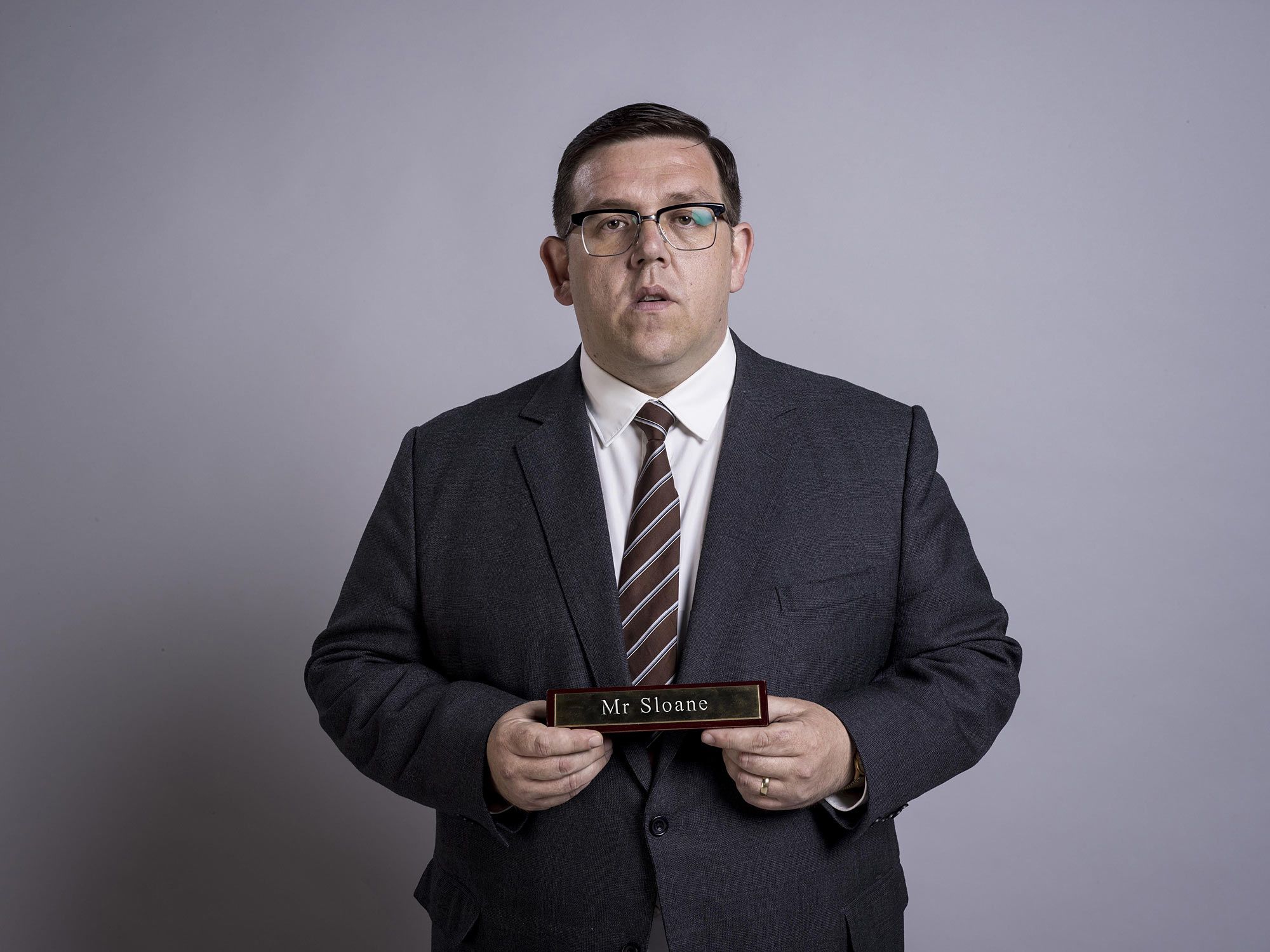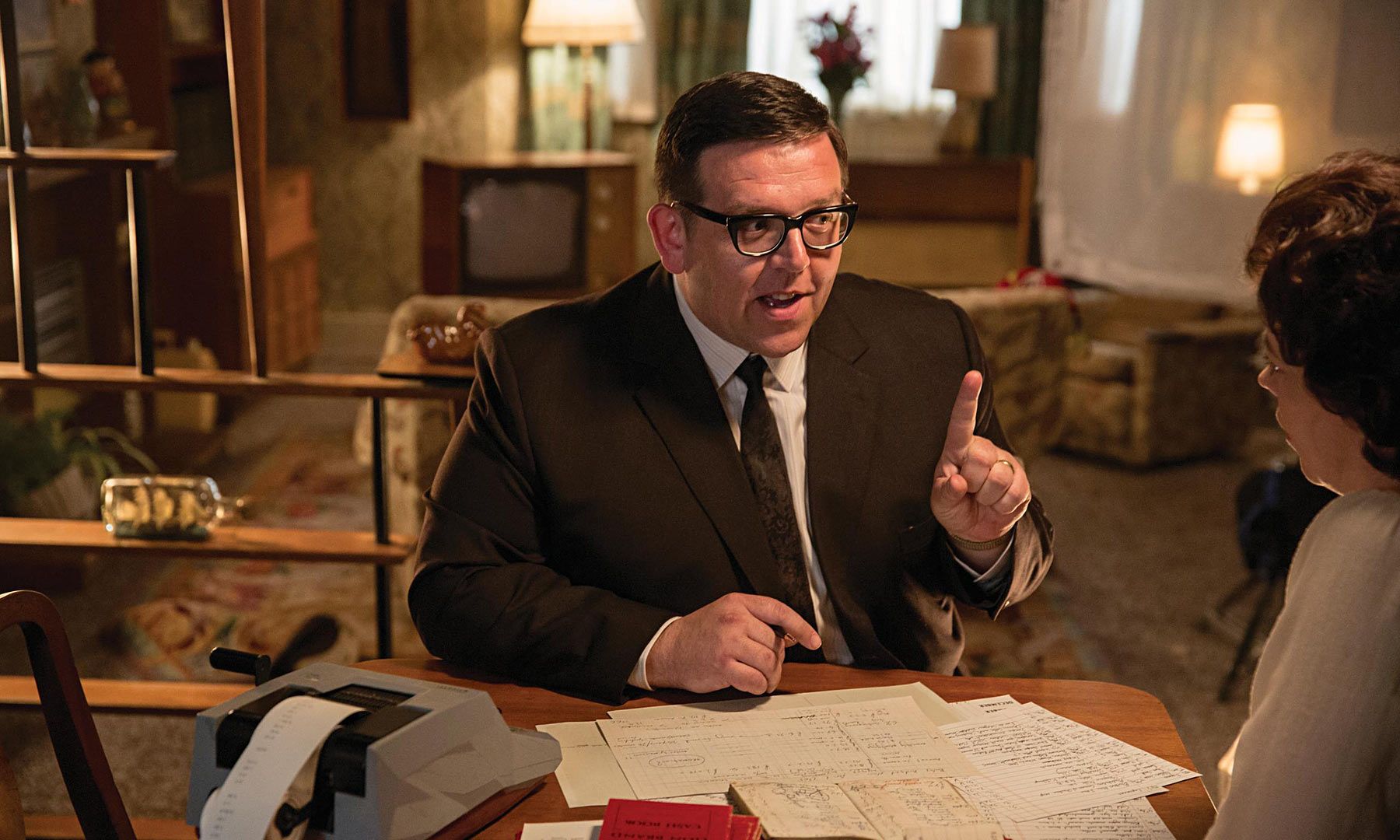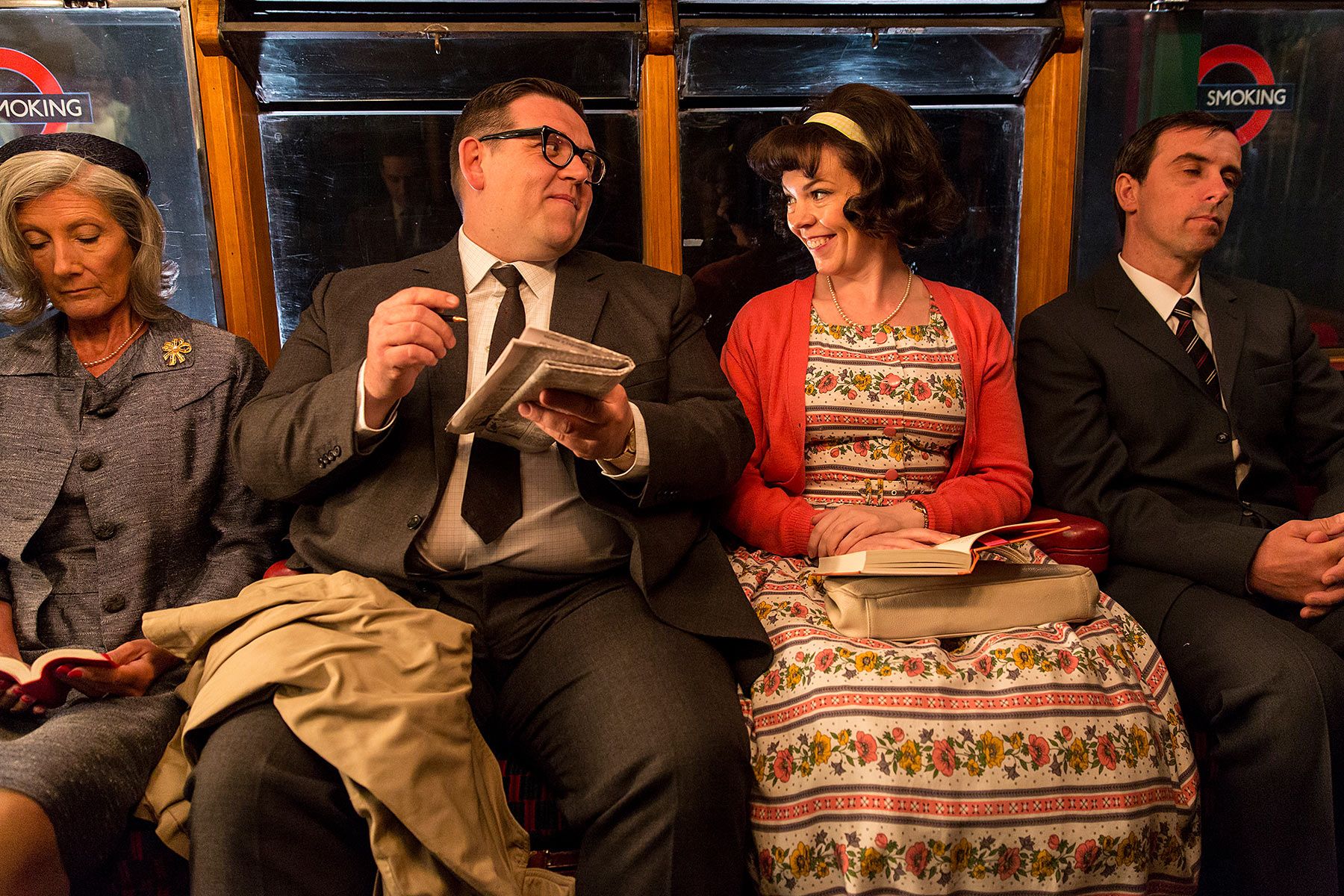As his filmography shows, Robert B. Weide knows comedy inside and out. Not only has the accomplished writer/director/producer made a series of acclaimed documentaries on some of the most legendary and influential comedians of the past century -- The Marx Brothers, W.C. Fields, Mort Sahl, Lenny Bruce and Woody Allen -- he's also delivered his own brand of hilarity as a prolific writer and Emmy-winning director on Larry David's HBO sitcom "Curb Your Enthusiasm" as well as episodes of "Parks & Recreation" and "Marry Me." And now that he's made you laugh, he wants to make you feel a little something more.
Weide flexes his seriocomic muscles with "Mr. Sloane," a dramedy starring genre/comedy favorite Nick Frost in a more grounded role as a middle-aged, middle-class man in late-'60s suburban England who finds his life in crisis after his marriage crumbles and his career flounders. The series -- originally made for Britain's Sky Atlantic, makes its U.S. debut in Los Angeles' KCET on May 7, with all seven episodes available streaming nationwide May 17 -- and it balances "Curb"-esque squirm-inducing comedic moments of hilarious discomfort with bittersweet pathos.
In a one-on-one chat with Spinoff Online, Weide talks about the series, his place in the world of comedy and his long-gestating documentary on literary lion Kurt Vonnegut.
Spinoff Online: What was the thing about "Mr. Sloane" -- the concept, the idea that sparked it -- that made you want to bring it to fruition? What was the thing you just couldn't resist about this project?
Robert B. Weide: Well, it all started with Nick. Nick and I had been friends since I spent a year in England in 2007-2008. I directed a picture with Simon Pegg called "How To Lose Friends and Alienate People." So I became friends with a lot of Simon's friends, including his main partner in crime, Mr. Frost.
It was years after that, I don't know, it was maybe 2011 or so that this idea just came to me. It actually came to me in an odd way as I was on the freeway. I was driving out to Orange County from Los Angeles. And I caught a quick glimpse of a guy in the car to my right who actually looked like Nick, if Nick had been a very conservative accountant in the 1960s. He had this crew cut. And his face was very similar to Nick's and his body type was similar to Nick's. But he had a crew cut, he had these dark horn-rimmed glasses, wearing a jacket and tie. He just looked like a very square Nick Frost, and that was sort of the beginning of it.
I just started to think about that character and who is he? And what's his life like? And I started to fabricate this idea based on Nick Frost being a conservative accountant in the '60s. And I came up with the name Jeremy Sloane, and the name of the series would be “Mr. Sloane.” And I had this idea that his wife had left him, and that he had lost his job. And he was now kind of floundering and getting part time work as a substitute teacher. The whole idea just sort of unfolded. I wrote to Nick and I said, "Would you consider doing a television series again?" And Nick was on board, and that was it.
So I wrote it for him, and that was, to me, the exciting part of it, was writing something for Nick that was tailor-made. I wanted to give him things to do that I haven't seen him do before. I knew he would be great with the comedy, but I also had a sneaking suspicion that Nick was a much better actor than a lot of people knew. So there's dark stuff in there. There's dramatic stuff. There's even romantic stuff. He just nailed it all. So that was really the passion for it. The idea was one thing. But the idea of being able to do it for Nick is what made it really exciting.
And Nick's a real renaissance man himself, so I'm curious about your collaboration with him and the degree of input and shaping of the project that he had.
Well, it wasn't extensive. I did write this, I went off and wrote this on my own. I sent the scripts to him when they were finished. There were two writers. One each collaborated with me on a specific episode -- I think episodes four and…I don't even remember which ones now. Now, once the scripts were handed over to Nick there were, I think, two or three days that we spent in my apartment in London. He would just give me ideas for little things. "Do you mind if I change this? Or can we change this line to this? Or what if I said this instead?" All that stuff's fine with me. I'm not very precious about my own writing, especially when you've got a great mind like Nick's who is looking to suit the material even further to his voice. So it's all fine.
And then, there's always days on the set where at the last minute, and Nick was always very respectful and very differential and always asking my permission about things. "Would you mind if I said this?" or "Can I change this?" So there are little tweaks like that. Nothing more than that. But that was all welcome and that all sort of improved it. So it was all fine with me.
What was the fun of it for you? You certainly have plenty of experience, particularly on "Curb Your Enthusiasm," with the comedy of discomfort. But this one has a different element because Sloane is such a decent guy, and Nick gives off such a decent vibe that when things go awry, you feel more badly for him than you do for, say, Larry David. So tell me about the fun of working that kind of comedy with more of a bittersweet element.
Well, those were two things, I mean, "Curb" was just about being funny and nothing more. There's no sentimentality in it. There's no real drama of any kind. So it was fun to do something like this where I could play those cards as well. And again, know that I had an actor who could pull it off.
As far as sympathizing with the character, yeah -- Nick by nature, I think, is somebody who sort of gets you rooting for him right away and this character especially. We start on the bleakest day of his life, perhaps. Where he decides to end it all. It's a gag, but it's more than a gag when the thing fails. And he falls to the floor, and then the phone rings. It's one of his maids saying, "Hey, we're at the pub waiting for you. Where are you?" And he says, "I'll be right over," like nothing happened. Then he shows up and he's got the little bandage on his forehead. But he's not saying anything. We know right away that this is a guy who's sweeping a lot under the rug. So we feel for him. And I think we root for him.
It's, to me, a very fun kind of comedic device to have a character who things don't always go right for him. Then you give him hope. You dangle a carrot in front of him. Then he's intrigued enough finally to reach for it, to grab for it, then you yank it away. I just find that sort of a fun, comedic device. Yeah, he's a character that hopefully you root for. Through the course of the series, there's a lot of ups and downs for him. It winds up that his friends may not be as loyal as we thought they were. He meets the girl in the pilot who maybe comes back later. And we're sort of rooting for him to get back together with his wife. Then we're not so certain that that's a good thing. So yeah. It was a series that allowed me to play a lot more notes on the scale than "Curb," which just played the funny scale.
There is a tradition in certainly British comedy where the lead character is something of a buffoon. You've got, say, David Brent from "The Office" -- Ricky Gervais' character. You've got Alan Partridge [character played by Steve Coogan], who's a great character. You've got Steve Coogan and John Cleese with Basil Fawlty, and certainly Larry David has that too. A lot of their troubles come out; a lot of the comic premises come out of the fact that they're sort of socially inept and don't know how to behave with other people. And they're a little self-centered or self-involved. And Sloane isn't like that.
Sloane is really a decent guy who's just trying to make the best of it, and bad things just happen to him. So it's a different kind of character in that we enjoy the comedy of these things happening to him. Like, when the classroom just sort of explodes when he's on his first day, in the first couple minutes. He's trying to teach the class. But we're rooting for him to succeed. So I think that makes it a little different from the typical British comedic hero.
What did you find creatively stimulating about working within the British television system? And what were some of the surprising elements of their industry as opposed to the traditional U.S. version of doing things?
Well, I found it to be not terribly different. Only because my primary experience working as, not just a director, but a creator and a writer, my experience is primarily with "Curb Your Enthusiasm," a) which is for HBO, and b) had Larry David at the forefront and nobody was going to try to mess with him creatively or to interfere creatively and then try to tell him what to do. So I enjoyed the benefit of that by working with Larry that I didn't have to deal with a lot of creative interference or network people saying, "Oh could you do this instead or that instead?"
Now, if you work for one of the broadcast networks out here, you'd be getting all kinds of interference. Supposedly well-meaning executives and suits and ties who maybe aren't the funniest people in the world try to tell you how to make it funny or telling you what to do or interfering in the editing room. And everyone has opinions about casting and everything else.
So if that'd been my experience, I think working in England would have been a very different kind of experience because I think they trust the creative people, the show creators in England, a bit more than they do out here. Traditionally, a little bit, there's less interference. But because I came from the HBO world instead of the network world, I found it not to be that different. It was very enjoyable, and I think it helped the fact that I wrote the pilot script on spec. I wrote it on my own. And then sold it to the network afterwards.
Rather than developing it with the network and having them involved during that process, I think the fact that I came to them, I was ready to go, I could hold it in my hand and pretty much tell them up front that I wasn't interested in a lot of interference, that notes were fine, feedback was fine, input was fine -- but that ultimately any final decision about how to carry something off or how to cast or how to shoot something or the writing or the editing, would be mine. And to their credit, they respected that. So I found it to be all in all a very comfortable, breezy experience.
You spent a lot of your career and your life working in comedy and studying comedy, both being in the trenches and also looking closely at comedy, starting with your Marx Brothers documentary and on through your recent Woody Allen doc for "American Masters." Tell me what it means to you to be working in comedy and to be trying different things and to not just be hitting the same notes over and over, but to kind of reach out for something else and to shift it up, and yet still be funny. What's that like for you at this point in your career?
Well, listen, when you grew up loving comedy, which I did, I love comedy movies and I love standup comedy. I'm just old enough to be on the tail end of "The Ed Sullivan Show" remembering the last couple years of "The Ed Sullivan Show." And of course the Carson "Tonight Show." I mean, I just loved standup and I loved… not all of it I had discerning taste even at a younger age. I was starting with the Marx Brothers. Then I loved Woody Allen movies. The Marx Brothers led me to W.C. Fields and Laurel and Hardy. That was all my bread and butter. That was my creative input during a very formative stage of my life. So of course, it's wonderful to do what you love for a living. I'm one of a very small percentage of people who really get to kind of do what their hobby is and make a living from it. So that's great. And comedy, like everything else, is always subjective. What you find funny, I may not find funny. What I think is hysterical, you may find very dull.
So the other thing where I've been very fortunate is being able to pursue my own things and not be stuck working on a show that I don't really like, but I'm making a living. But to create my own things and to work on things that I love is just a great plus. So my only criteria for what I work on, is I have to have some passion for it. I have to be excited about it. I've never really taken a job just because, "Well, I need to work and somebody's offering this." So I've been fortunate enough that I've been able to kind of keep the "scam" going, working on projects that are meaningful to me.
Now consequently, I have about the strangest resume that anybody can have. On IMDb, you've got the documentaries on one hand, which are primarily comedic. You've got the Kurt Vonnegut film, "Mother Night," which is for the most part, pretty heavy drama. You've got "Curb Your Enthusiasm." Then you've got "Mr. Sloane," which is a different kind of thing. You've got "The Giver," which came out last year, which is something I wrote 18 years ago based on the young adult novel. It's just all over the place. But that's because, like I said, the criteria is I have to be interested.
Within the world of comedy, you've got "Curb," which is just funny. Then "Sloane" allows me to play the sentimental card, the romance card, and the drama card a little bit, too. So I'm lucky that I've been able to keep this going. I'm at an age now, when I started I was 22 years old when I did my Marx Brothers film. I'm 55 now. So I'm at an age where, a lot of people are feeling the pressure of being put out to pasture, if they haven't already been put out to pasture. So to be able to keep it going for a while longer is, that's already a lot to hope for.
From what I understand, your documentary about Kurt Vonnegut is really close to finally being out there for all of us to see. Can you kind of give me a status update on that one?
Sure. Well, it sounds like you may already know that this has been going on for quite some time. I first approached him soon after my Marx Brothers documentary. I was 22 years old. I wrote a letter to him saying I'd like to do a documentary on him. We met soon after that. We spoke on the phone soon after that. We met a few months later. He authorized it right away. I started filming him in 1988 and continued to film with him on and off until shortly before he died in 2007.
The fact that the film was taking so long to make, I thought possibly needed some explanation. The fact that he and I became very good friends during the course of it, I felt needed some disclosure because it was, in some ways, affecting the film. The whole thing was sort of a big question mark. I was just sitting on a lot of footage, not certain what to do. Having no idea how to get it financed because everyone I'd been to, either wanted to do it but had no money, or had the money but didn't want to do it. So I brought on another filmmaker just last year, a guy named Don Argott. He is now covering the meta elements of the film. I continue making my film on Kurt Vonnegut. He's essentially making a film on me, trying to make the film on Kurt Vonnegut for 30 years and the struggles of that, and how our friendship grew over that time.
The financing was still an issue, but last month we concluded a Kickstarter campaign that raised $300,000. So now, we're back in business and we're filming. So it's very exciting to finally get this film off the development slate and to get it made. So we're hoping either at the end of this year or the early part of next year to have that film finished. This film has had a lot of people following its progress, at least since the late 80s, who have been eager to see it. But no one's been more eager than I have. So we're finally we're getting there.
"Mr. Sloane" debuts in Los Angeles tonight at 10pm on KCET. The series will be available streaming on Link TV starting Sunday, May 17.




